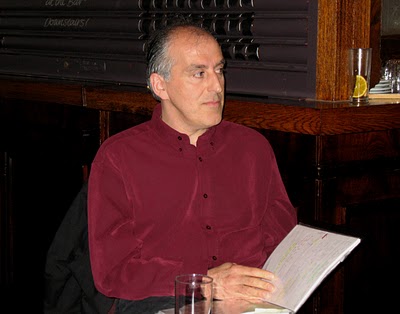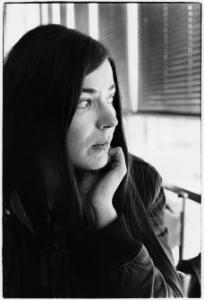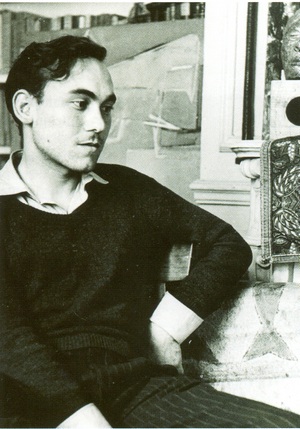De Engelse dichter en schrijver Mario Petrucci werd geboren op 29 november 1958 in Londen. Zie ook alle tags voor Mario Petrucci op dit blog.
THE LIBERATION OF BERLIN ZOO
(1945)
“Whenever you see a green space in Berlin be very suspicious.” Pieke Biermann
A shell ladders the wire fence top to bottom –
skids to its middle in mud, a huge sizzling clove.
And out they stalk under wide noonlight –
wary at first, casting this way and this
with the yellow of hunger that winks
in phosphorescent coins. The cats currmurr –
a liquid that beats in their throats low and thick,
almost a cello. Movement stirs instinct –
ankles, wrists, pale exposures of neck.
Jaguar begins. Her continents of muscle
flinch. She unwinds her crouch into the convoy’s
parallel herd – embraces from behind, full pelt,
a traffic policeman, his white-gloved salute
the flash of a doe’s tail. In the act of being
savaged his hands signal on – and for seconds
diverted trucks respond without dent or screech.
On Tiergartenstrasse, Panther is surprised
onto its haunches by Oberkommandierender Guttmann
rounding a bend. Animal meets animal. Panther
grins – lifts a black velvet claw. Guttmann
raises a hand. And for a moment they are old
co-conspirators slapping pad to palm – before
a single swipe opens a flap in Guttmann’s pot
neatly through the buttonhole, spills his coils
into winter which at last he feels, threading him.
Panther swills bloodwine. Fangs the sweet cakes
of a half-digested Limburger lunch.
Orang-utan has mounted a tram. Points back
at children, one arm trailed in a mockery of style,
chin cocked to velocity’s breeze. Tonight she’ll drag
knuckles right up the Reichstag steps, plant
a trained suck on the cheek of the porter. His look
will pale her into intelligence. On Potsdamer Platz
Zho crops turf. Her eyes betray a sidewise disposition
towards predators louche in the alleys behind speakeasy
and bar. Yet something is missing from the maw
of buildings – a tooth pulled from history to make
this square of sward, which Zho crops simply because
it grows, because it ranks so unnaturally green.
Last is Python. Her anvil head, by degrees,
jacks towards dim hammerings of free air, grim
to push the die-cast snout into any nest of blood.
The cold slides into her. She slops into culverts
heavy as a rope of copper – moulds to the sewers,
wraps the city in coils of intention. Develops
a rattle for Russia, a string of diamond yellows
for Poland. She winds up a tension. And Berlin ticks
inwards, becomes a city breathless, a gasp of dust
where Volkswagens are specks, circling crazily.
But there is nothing to fear. Not now. The cats
have had their fill – only pawprints lead through snow
down to the mouths of alleys. A white-gloved
claw is on the kerb. The people walk round it, pull
tight their collars. Eventually, from a windowbox
in Charlottenburg Palace, a single petal of phlox
will bear down into the shallow cup of its palm
with all the weight of a snowflake.

Mario Petrucci (Londen, 29 november 1958)
Lees verder “Mario Petrucci, Carlo Levi, Jean-Philippe Toussaint, C.S. Lewis, Wilhelm Hauff”


